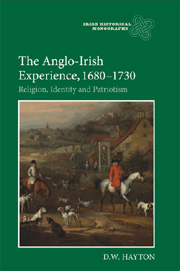Book contents
- Frontmatter
- Contents
- List of Illustrations
- Acknowledgments
- Abbreviations
- Preface
- Note on dates and quotations
- 1 From barbarian to burlesque: the changing stereotype of the Irish
- 2 Anglo-Irish attitudes: shifting perceptions of national identity
- 3 Aristocratic decline: the fall of the house of Ormond
- 4 A presence in the country: the Brodricks and their ‘interest’
- 5 ‘Commonwealthman’, unionist and king's servant: Henry Maxwell and the Whig imperative
- 6 ‘Paltry underlings of state’? The character and aspirations of the ‘Castle’ party, 1715–32
- 7 Creating industrious Protestants: charity schools and the enterprise of religious and social reformation
- 8 A question of upbringing: Thomas Prior, Sir John Rawdon, 3rd Bt, and the mentality and ideology of ‘improvement’
- Bibliography of secondary works
- Index
Preface
Published online by Cambridge University Press: 05 February 2013
- Frontmatter
- Contents
- List of Illustrations
- Acknowledgments
- Abbreviations
- Preface
- Note on dates and quotations
- 1 From barbarian to burlesque: the changing stereotype of the Irish
- 2 Anglo-Irish attitudes: shifting perceptions of national identity
- 3 Aristocratic decline: the fall of the house of Ormond
- 4 A presence in the country: the Brodricks and their ‘interest’
- 5 ‘Commonwealthman’, unionist and king's servant: Henry Maxwell and the Whig imperative
- 6 ‘Paltry underlings of state’? The character and aspirations of the ‘Castle’ party, 1715–32
- 7 Creating industrious Protestants: charity schools and the enterprise of religious and social reformation
- 8 A question of upbringing: Thomas Prior, Sir John Rawdon, 3rd Bt, and the mentality and ideology of ‘improvement’
- Bibliography of secondary works
- Index
Summary
The defeat of the Jacobite forces in 1690–91 confirmed in power in Ireland a Protestant landed class of predominantly English descent, most of whom still regarded themselves as representatives of the ‘English interest’ in the country. This fact may well render early eighteenth-century Ireland a ‘colonial’ society, as some historians have argued, even though the ‘colonial’ or ‘planter’ class which possessed economic and political power was ethnically various, and the process by which they had settled (and were in a few cases continuing to settle) in Ireland had been long drawn out. The majority, it is true, descended from families who had come over to Ireland in the various plantations of the sixteenth and early seventeenth centuries (the so-called ‘New English’), together with a further substantial stratum deposited after the Cromwellian confiscations. But Protestant landed society also included ‘Old English’ families who had settled in Ireland long before the Reformation and had abandoned their Catholic allegiance – representatives of Anglo-Norman baronial dynasties such as the Butler dukes of Ormond and the Fitzgerald earls of Kildare, and even descendants of Gaelic lords, such as the O'Brien earls of Inchiquin, who traced their ancestry to the high-king Brian Boru.
Despite this diversity, the propertied elite of early eighteenth-century Ireland proved remarkably coherent. They were held together by a common Protestantism, and a sense that their security depended ultimately on the military backing of the English crown and parliament.
- Type
- Chapter
- Information
- The Anglo-Irish Experience, 1680-1730Religion, Identity and Patriotism, pp. xiii - xviPublisher: Boydell & BrewerPrint publication year: 2012



